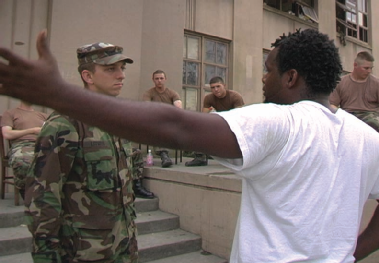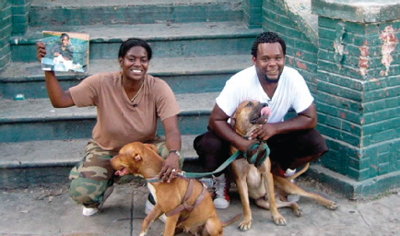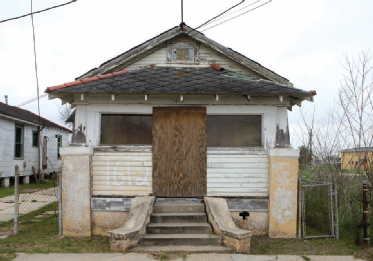Lessin does not like the taste of compromise. It's why she values the title independent filmmaker: she needn't tone down her rhetoric to preserve access to people in power nor make stories more palatable to maintain her press credentials. "Storytelling is about conflict," she says, not concession.

While editing the garment industry exposé Behind the Labels several years ago, Lessin had intercut commercials from retailers like Gap and Tommy Hilfiger against hidden camera footage of the offshore indentured labor that the companies were using. Executives at the television network that commissioned the film insisted that Lessin remove the ads; she replaced them with generic footage of models on a catwalk. "It was censorship, plain and simple," she says. "Since then, I have fought for every frame in my work and my free speech, and I haven't lost yet."
But such resilience—the very motif of Trouble the Water, which takes its name from the lyrics of an African American spiritual—was vital amid the search for funding and distribution. Potential distributors claimed the country was suffering "Katrina fatigue." One network executive asked, "This isn't going to be political, is it?," while others considered their audience's demographic and bluntly told the filmmakers they would rather see a story with white characters. Such repeated door-slamming, says Lessin, "just kind of made us want to do it more."

'The audience isn't going to respond to anything unless you as a filmmaker and your camera are responding to it. So we go by instinct.'Lessin and Deal had managed to pool grants from several sources like the Sundance Institute, the Open Society Institute, and Creative Capital—enough to continue filming and begin editing. But when they were about to run out of money, Lessin screened the nearly finished film for her old friend (and fellow anti-apartheid activist) Josyln Barnes '85, co-founder of Louverture Films. "The story gets inside the experience of people living on the margins— who, through a terrible crisis, actually came to understand their own self-worth and were able to step outside their immediate circumstances and see themselves in a different way," says Barnes, who raved about the film to her producing partner, actor Danny Glover. The duo came on board as executive producers, raising funds so Lessin and Deal could complete the movie and premiere it at the Sundance Film Festival in January 2008, one of sixteen documentaries selected for the competition.
The first screening got a standing ovation. The next morning—Martin Luther King Jr. Day— Kim Roberts gave birth to the couple's first child. The following Saturday, the Sundance awards were announced. As the winners for directing, screenwriting, and cinematography were revealed, Lessin and Deal figured they'd been shut out, because all that remained was the Grand Jury Prize for nonfiction. But for their first film ever shown at Sundance, they won the top prize. "Incredibly validating," says Lessin, and in the next breath, "We certainly hoped it would get us a distributor."
Zeitgeist Films signed on, and the film had its national premiere the following August. Since then, it has been screened in some 300 cities (it aired on HBO in April 2009 and was released on DVD in August), and the filmmakers have traveled constantly to promote it. If it was Tuesday, it was Roger Ebert's Film Festival in Illinois or the Full Frame Film Festival in North Carolina. Lessin and Deal have brought the story of New Orleans to Paris and Rome, Toronto and Calgary, Mexico City and Berlin. They screened the film at the King Center in Atlanta, even the 2008 Democratic National Convention in Denver—where New Orleans Mayor Ray Nagin and Louisiana Senator Mary Landrieu, two oft-criticized figures in the aftermath of Katrina, were in the audience. (Landrieu tearfully embraced Kim Roberts after the film; Nagin watched the first few minutes, then walked out.)

Meanwhile, the accolades continued rolling in, including nominations for an NAACP Image Award and a Producers Guild of America Award, as well as the Academy Award nod (though the Oscar went to Man on Wire). Yes, Lessin was a bit star-struck when Robert Downey Jr. congratulated her at a pre-Oscar luncheon, and she did seek out Brad Pitt during a break in the ceremony (she thanked him for his efforts toward rebuilding New Orleans). "I enjoyed being transported out of my world for a period of time," she says.
But ultimately, Lessin saw the nomination as an opportunity. Having learned, while working with Moore, how cinema can impact the national conversation, she and Deal launched an out-reach effort with Blue State Digital, the Internet strategy firm that developed Barack Obama's online presidential campaign. They created a "Take Action" link on the movie's website (troublethe waterfilm.com), which leads to an online form for sending messages to lawmakers, urging them to support legislation to rebuild the region. Last August, on the fourth anniversary of Katrina, the Gulf Coast Civic Works Campaign presented 20,000 of the messages to House Speaker Nancy Pelosi. "I want to make films that tell stories and move people," says Lessin. "But we also wanted to make sure that it was serving some greater good."
Longtime CAM contributor Brad Herzog '90 has witnessed more than two dozen Academy Award ceremonies—from his living room.
{youtube}Cq426VjZD1E{/youtube}
Trailer for Trouble the Water (2:01)


